J-Lab is a journalism catalyst. As the news and journalism space is re-imagined, J-Lab helps increase the rate and spectrum of change.
We fund new approaches to journalism, research what works and share practical insights gained from years of working with news creators and news gatherers.
Our work
At our core are programs that inspire and equip news entrepreneurs, traditional media and others involved in the creation and evolution of news and information.
J-Lab has a long and respected track record of turning ideas into action. Through our pilot projects, innovation awards, consulting, research, learning modules and training, we create space for experimentation, identify what works and apply those insights to the future of journalism.
- We fund entrepreneurial news start-ups.
- We reward innovations in journalism.
- We incentivize new ways of delivering news and information.
- We deliver deep learning from more than a decade of helping news creators and news gatherers meet their goals.
- We act to help meet information needs in an evolving media ecosystem.
Our mission
J-Lab promises to jumpstart new ideas and identify what works as the news ecosystem evolves.
Our results
We consistently hear positive feedback:
- “J-Lab has a strong and respected reputation.”
- “J-Lab promotes cutting-edge journalism.”
- “J-Lab has a talent for identifying trends in the field and explaining how to take advantage of them in practical ways.“
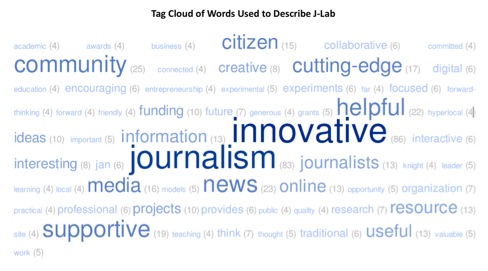
Learn more about J-Lab’s impact from this independent evaluation (PDF) commissioned by the Knight Foundation, a long-time supporter.
Read more about J-Lab’s history.
 Jan Schaffer
Jan Schaffer
Executive Director, jans@j-lab.org
Twitter: @janjlab
Jan Schaffer, executive director of J-Lab, runs one of the nation’s most successful incubators for news entrepreneurs and innovators and is a leading thinker on the emerging new media landscape.
A Pulitzer Prize winner for The Philadelphia Inquirer, she left daily journalism to lead pioneering journalism initiatives in civic journalism, interactive and participatory journalism and citizen media ventures.
She launched J-Lab in 2002 to help newsrooms use digital technologies to engage people in important public issues. The center has a history of rewarding new ideas and practices through the Knight-Batten Awards for Innovations in Journalism. It has helped launch 77 news start-ups through its New Voices and New Media Women Entrepreneurs projects. It pioneered 23 innovative collaborative journalism partnerships through its Networked Journalism project and its Enterprise Reporting Awards. The center publishes web tutorials on how to launch and manage startup news sites, and it develops information and resources for online community news sites at the Knight Citizen News Network.
J-Lab is the successor to the Pew Center for Civic Journalism, a $14 million project Schaffer previously led. From 1993 to 2002, the center helped to fund more than 120 pilot projects that developed new reporting techniques to engage people better in public life.
She brings more than 30 years of journalism experience to her work. Schaffer joined The Inquirer after earning a masters degree from the Medill School of Journalism, Northwestern University. For more than 20 years, she held a range of reporting and editing positions on the city desk, the national desk, in the business news department and was Business Editor when she left.
As a federal court reporter, she helped write a series that won freedom for a man wrongly convicted of five murders. The stories led to the civil rights convictions of six Philadelphia homicide detectives and won several national journalism awards, including the 1978 Pulitzer Prize Gold Medal for Public Service. Also while covering federal courts, she broke the Philadelphia Abscam story about the FBI sting operation that used agents posing as Arab sheiks. She was sentenced to jail for six months for refusing to reveal her sources; the sentence was stayed on appeal.
Schaffer serves on the Journalism Advisory Committee of the Ethics and Excellence in Journalism Foundation. She was a member of the 2011, 2012 and 2013 SXSW Accelerator Advisory Boards. She is a winner of the Manship Prize, awarded by Louisiana State University’s Manship School of Mass Communication for innovative media work that has advanced citizens’ understanding of challenges in the public arena.
Currently, Schaffer serves as a speaker, researcher, trainer, author, consultant and Web publisher on the future of journalism, civic engagement and education. She is married to a Smithsonian Magazine editor and has two children.
Advisory Board
 Jim Brady
Jim Brady
Project Thunderdome, Journal Register Company
Brady joined the Journal Register Company in 2011 to lead the digital transformation of all its newsrooms. A digital news veteran, the former Executive Editor of washingtonpost.com most recently served as founder and general manager of the innovative site TBD, a local news operation dedicated to comprehensive coverage of the Washington, D.C. region that combined traditional journalism and audience-powered reporting.
He was previously the sports editor and assistant managing editor for news from 1995 to 1999 at washingtonpost.com, and was on staff for the site’s official launch in June 1996. During his time in news, Brady helped coordinate the site’s coverage of the Clinton impeachment. After leaving washingtonpost.com in 1999, Brady spent more than four years at America Online, serving as Group Programming Director, News and Sports; Executive Director, Editorial Operations; and Vice President, Production & Operations. During his time at AOL, Brady was in charge of the service’s coverage of the 9/11 terrorist attacks and the 2000 presidential election. He later returned to washingtonpost.com as a consultant, focusing primarily on product development and strategy before being named the site’s executive editor in 2004.
Brady earned a Bachelor of Arts degree in Print Journalism from The American University in 1989.
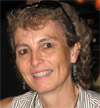 Jody Brannon
Jody Brannon
National Director, Carnegie-Knight News21, Arizona State University
Jody Brannon is the national director of the Carnegie-Knight News21 journalism initiative. She entered the world of digital media in its infancy, starting as a copy editor for The Washington Post’s first online initiative, Digital Ink, in April 1995. She rose to become manager of news and production and later managing editor of washingtonpost.com. She also served as executive producer at Washington Post and Newsweek Interactive before joining USAToday.com as executive producer.
Under her direction, multimedia news staffs won national awards from the Online News Association, Editor & Publisher, the Newspaper Association of America, the National Press Photographers Association, Associated Press Managing Editors and the National Press Foundation.
She is on the board of directors of the Online News Association and chairs the Knight-Batten Awards for Innovations in Journalism.
Prior to her work in digital media, Brannon worked in magazines and newspapers, primarily as a reporter and editor at the Tacoma News Tribune and Seattle Times.
Brannon has journalism degrees from Seattle University and American University and a doctoral degree in mass communication from the University of Maryland, where she studied the early days of multimedia journalism. Since 1988 she also has regularly taught a wide range of journalism courses at the University of Maryland, Pacific Lutheran University, Seattle University and American University, including the capstone seminar in its master’s program in interactive journalism for six years.
 Amy Eisman
Amy Eisman
Director of Writing Programs, School of Communication, American University
Amy Eisman oversees SOC’s basic writing classes and the weekend graduate journalism programs. She teaches reporting and writing for convergent media. Eisman was an editor with Gannett for 17 years, first as a cover story editor at USA TODAY and later as Executive Editor of USA WEEKEND. Eisman was also a managing editor at AOL and a Fulbright lecturer in Moscow.
Today she trains newsrooms on Web content and writing. She co-authored, with Larry Gillick, online training modules for Gannett about breaking news online, interactivity and database journalism. With Professor Wendell Cochran, she co-wrote a module about tools for citizen journalists for Knight Citizen News Network. She has held workshops at the washingtonpost.com, Freedom Forum, the Voice of America and Radio Free Europe/Radio Liberty in Prague and Moscow.
She has a bachelor’s degree from the University of Pennsylvania and a master’s from American.
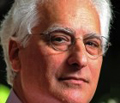 Howard Finberg
Howard Finberg
Director of Interactive Learning, The Poynter Institute
Howard I. Finberg is the director of interactive learning at The Poynter Institute, where he leads Poynter into the world of e-learning programs. He is responsible for the institute’s e-learning project, News University.
NewsU launched in 2005 and has more than 160,000 users in 225 countries, accessing more than 200 training modules. Finberg also teaches news executives and journalists about online and the impact the Internet has on the media industry. Finberg joined the Institute in 2003 after serving as its Presidential Scholar in 2002. His task was examining technology’s impact on media and how new technologies might be integrated into Poynter’s teaching and publishing.
Prior to joining Poynter he founded and ran The Digital Futurist Consultancy. Among his clients are the McClatchy Company, MediaNews Interactive, The San Francisco Chronicle, Hearst Interactive, Freedom Communications, the Houston Chronicle and the Newspaper Association of America. He also served as a senior fellow at The American Press Institute’s Media Center.
Finberg was a corporate vice president at Central Newspapers, prior to its sale to Gannett Corp., where he managed the company’s Internet and technology investments and provided strategic and operational guidance for the company’s print and online efforts. He served as a director at Phoenix Newspapers, Inc., which publishes The Arizona Republic.
At The Republic, Finberg led the creation and launch of the award-winning online service, Arizona Central on the Web and on America Online in early 1995. Finberg was honored as the Newspaper Association of America “New Media Pioneer” in 2000. He also held senior newsroom management positions at The Republic, the San Francisco Chronicle and the Chicago Tribune, and he worked at the San Jose Mercury News, San Francisco Examiner and The New York Times.
Finberg established the Chicago Tribune’s graphics desk, one of the country’s first such operations, and was the founding editor of the country’s first syndicated newspaper graphics service. A former teacher at Northwestern University and San Francisco State University, he is the co-author of Visual Editing: A Graphic Guide for Journalists (Wadsworth Publishing, Belmont, Calif.), a college-level textbook about newspaper design, informational graphics, illustrations and photography. He has also been a frequent speaker at industry conferences and has served as a judge for a number of website competitions.
 Richard Harwood
Richard Harwood
Founder and President, The Harwood Institute for Public Innovation
Richard C. Harwood is the founder and president of The Harwood Institute for Public Innovation, a nonprofit, catalytic organization dedicated to helping people imagine and act for the public good.
Over the past 20 years, he has become a leading national authority on improving America’s communities, raising standards of political conduct and re-engaging citizens on today’s most complex and controversial public issues.
Harwood has devoted his energies to spreading a vision for what American society should be and putting innovative practices to use on the ground to turn that vision into a reality.
He is the author of Hope Unraveled: The people’s retreat and our way back (2005), as well as Make Hope Real: How we can accelerate change for the public good (2008).
Harwood is a frequent keynote speaker for foundations and national organizations. He is a commentator and contributor on national and syndicated television, newspapers, radio and web sites, including MSNBC, NPR, The Christian Science Monitor, CNN’s Inside Politics, The Jim Bohannon Show, Special Report with Brit Hume, C-SPAN, and many other media outlets.
In October of 1999, Harwood was a featured speaker along with Colin Powell and Doris Kearns Goodwin at the White House Fellows 35th Anniversary Program. He is a faculty member of the Public Affairs Institute and also has lectured at the Poynter Institute, a national school of journalism.
Rich did his undergraduate work in Political Economy at Skidmore College. He graduated Phi Beta Kappa and was a Harry S Truman Scholar. He received his Master of Arts in public affairs from Princeton University’s Woodrow Wilson School of Public and International Affairs.
 Gary Kebbel
Gary Kebbel
Dean and Professor, University of Nebraska – Lincoln, College of Journalism and Mass Communications
Gary Kebbel, the former journalism program director for the John S. and James L. Knight Foundation, was recently appointed dean of the College of Journalism and Mass Communications at the University of Nebraska – Lincoln.
As journalism program director for the Knight Foundation, Kebbel directed the $25 million Knight News Challenge, which funds digital news innovations. He has been director of AOL News, was founding editor of USAToday.com and Newsweek.com. He also directed AOL’s online election and government guides. He was a graphics editor at USA Today and managing editor for The Record in Troy, N.Y.; managing editor and assistant managing editor of the Post-Star in Glens Falls, N.Y.; and city editor of the Ithaca (N.Y.) Journal.
He has been adjunct instructor at Philip Merrill College of Journalism, College Park, Md.; Northern Illinois University; and Adirondack Community College. He has a bachelor’s degree from Illinois State University, master’s degrees in journalism and political science from University of Illinois, and an Master of Social Work from the Catholic University of America. He assisted the State and Defense departments by teaching public affairs officers the latest digital media and social networking techniques.
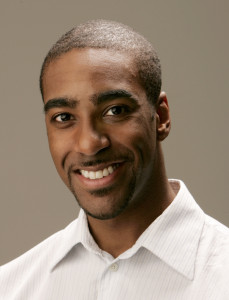 Matt Thompson
Matt Thompson
Editorial Product Manager, NPR
Matt Thompson is currently working with NPR to develop 12 topic-focused local news sites in conjunction with NPR member stations. He worked as the interim Online Community Manager for the Knight Foundation and did research context-centric news websites, which are quickly becoming the future of journalistic ventures. Before working at the Knight Foundation, he worked as the deputy Web editor for the Minneapolis Star Tribune and managed technology and interactive-related projects.
He also created EPIC 2014, a flash movie about journalism, set 10 years in the future. He graduated with honors in English from Harvard College in 2002.
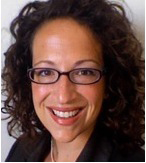 Amy Webb
Amy Webb
CEO and Principal Consultant, Webbmedia Group
Amy is an author, speaker and future thinker, adapting current and emerging technologies for use in communications. She has spent more than 15 years working with digital media, founding several web-based companies and now advising various startups, journalism associations and media groups as well as Webbmedia’s clients all over the world.
Amy began her career as a reporter/writer with Newsweek (Tokyo) and the Wall Street Journal (Hong Kong) where she covered emerging technology, media and cultural trends. She later contributed to the New York Times, NPR, Economist and many publications and broadcast shows. Her work has been recognized with awards/nominations from Webby, Editor & Publisher, Investigative Reporters & Editors, Society of Professional Journalists, W3 and IAVA. She has a Master of Science from the Columbia University Graduate School of Journalism and holds a Bachelor of Arts in political economics from Indiana University in Bloomington, IN. She also earned Nikyu Certification in the Japanese government-administered Language Proficiency Test and speaks fluently.
Amy serves on the Board of Directors for the Online News Association, is a Knight News Challenge judge, and serves on advisory boards for Knight-Batten, Temple University’s Journalism Program, and the International Center for Journalists. Amy is also a member of the Academy of Television Arts & Sciences and is a judge for the Emmy(r) awards. She has been on the adjunct journalism faculty at University of Maryland, Temple University, Tokyo University and University of the Arts. Amy is a featured speaker at conferences around the world and regularly appears on various broadcast shows.
 Kinsey Wilson
Kinsey Wilson
Senior Vice President and General Manager, Digital Media, NPR
Kinsey Wilson has played a leadership role in digital media for more than a decade. As a senior news executive he has provided strategic and operational oversight of print and online news operations and been a leader in industry organizations during a period of rapid technological and cultural change.
He joined NPR as Senior Vice President and General Manager of Digital Media in October 2008, with responsibility for NPR’s web, podcasting and mobile operations.
Wilson began his journalism career at Chicago’s legendary City News Bureau where he covered cops and worked the overnight desk. He was a print reporter for 15 years, seven of them at Newsday, before he made the leap to online media in 1995.
Wilson received a bachelor’s degree in political science from the University of Chicago in 1979, specializing in African studies. He and his wife have lived in the Washington, D.C. area since 1995.
 Jose Zamora
Jose Zamora
Journalism Associate, Knight Foundation
Jose Zamora is a Journalism Program Associate at Knight Foundation. Jose helps manage Knight Foundation’s digital journalism portfolio, including the Knight News Challenge, a five-year, $25 million initiative to spur media innovation. He is a journalist, columnist, blogger and a former news executive with el Periódico in Guatemala.
He has a Law degree from Universidad Francisco Marroquín, a specialization in Media Law from Oxford’s Media Law Advocates Program and a master’s in public affairs from the University of Texas at Austin. He is an Organization of American States Scholar who focused his work on Media and Democracy.
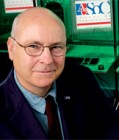 Larry Kirkman
Larry Kirkman
Dean Emeritus, School of Communication, American University
Larry Kirkman is the former dean of the American University School of Communication, where he directed and developed academic and professional programs in Journalism, Film and Media Arts and Public Communication with a cross-cutting focus on public affairs and public service.
Dean Kirkman came to AU in 2001 from the Benton Foundation. As director of Benton, from 1989 to 2001, he created programs in strategic communications for nonprofit organizations, public media, and communications policy. Under his direction, Benton became a leading nonprofit Internet publisher, producing online knowledge networks that served as test-beds for journalism, education and social action. He launched the U.S. Center for www.oneworld.net, and he served as Chair of the One World International Foundation from 2002 to 2006. He serves on the Public Issues Advisory Committee of The Advertising Council. He served in various roles for the Council on Foundations and its affinity groups, including: chair of the Communication Committee; chair of the Film and Video Festival; and chair of the Communications Committee for the Funders for Citizen Participation.
Prior to his work at the Benton Foundation, Dean Kirkman was the founding director of the Labor Institute of Public Affairs, where he worked from 1982 to 1989, and he worked at the American Film Institute from 1979 to 1982. As an AU professor in the 1970s, he helped bring the School of Communication into the video age while serving as editor of TeleVisions magazine.
J-Lab’s financial support comes from several sources, including grants, consulting, and income from publications and workshops.
Several foundations have backed various J-Lab activities:

The Gannett Foundation funded a training summit for women news entrepreneurs, as well as the development of a suite of case studies and start-up resources.
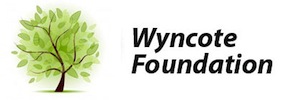
The Wyncote Foundation recently funded a survey by J-Lab to identify emerging models of collaboration between public radio stations and their local and regional media counterparts.

The Knight Foundation supported the Knight-Batten Awards for Innovations in Journalism, the Knight Community News Network site, J-Learning and the New Voices initiatives.
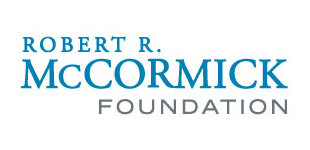
The McCormick Foundation supported the McCormick New Media Women Entrepreneurs initiative.

The Ethics and Excellence in Journalism Foundation supported J-Lab’s training and professional development and the creation of learning modules for entrepreneurial journalists.
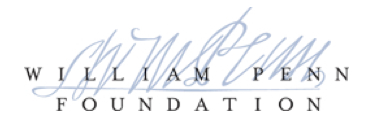
The William Penn Foundation supported J-Lab media-mapping activities, research in Philadelphia and the Philadelphia Enterprise Reporting Awards.
![]()
The Ford Foundation supported J-Lab’s seminal 2007 report on the rise of citizen media ventures.
See more information on our consulting activities here.
J-Lab: The Institute for Interactive Journalism launched in 2002 to help journalists and citizens use digital technologies to develop new ways for people to participate in public life through the media.
It quickly became one of the first players in the news innovations space, drawing on more than a decade of pioneering civic journalism work, led by J-Lab founder Jan Schaffer. As the director of the Pew Center for Civic Journalism, she seeded 120 pilot projects in newsrooms around the country that helped to create and refine better ways of reporting the news to re-engage people in public life.
J-Lab was initially based at the University of Maryland’s Merrill College of Journalism. In 2008, it became a center of American University’s School of Communications with a large scope of work funded by a $2.4 million grant from the John S. and James L. Knight Foundation.
J-Lab is a proven funder and supporter of new ideas that have worked. We have amassed a tremendous amount of data and lessons learned from monitoring and incentivizing change. Our efforts influence news entrepreneurs, content creators, traditional news organizations and communicators of all types.






